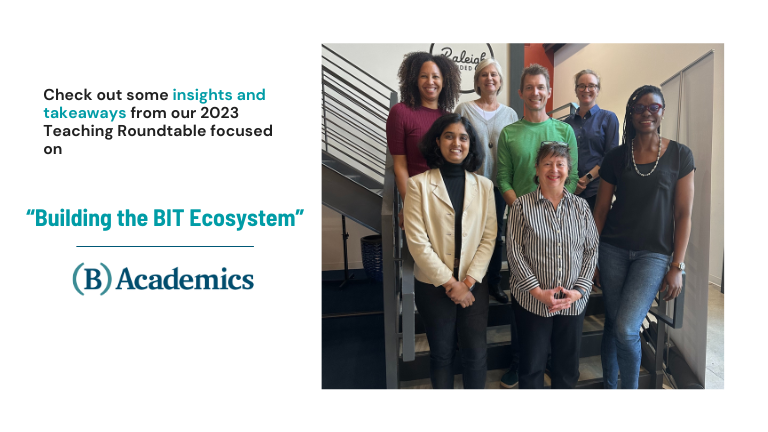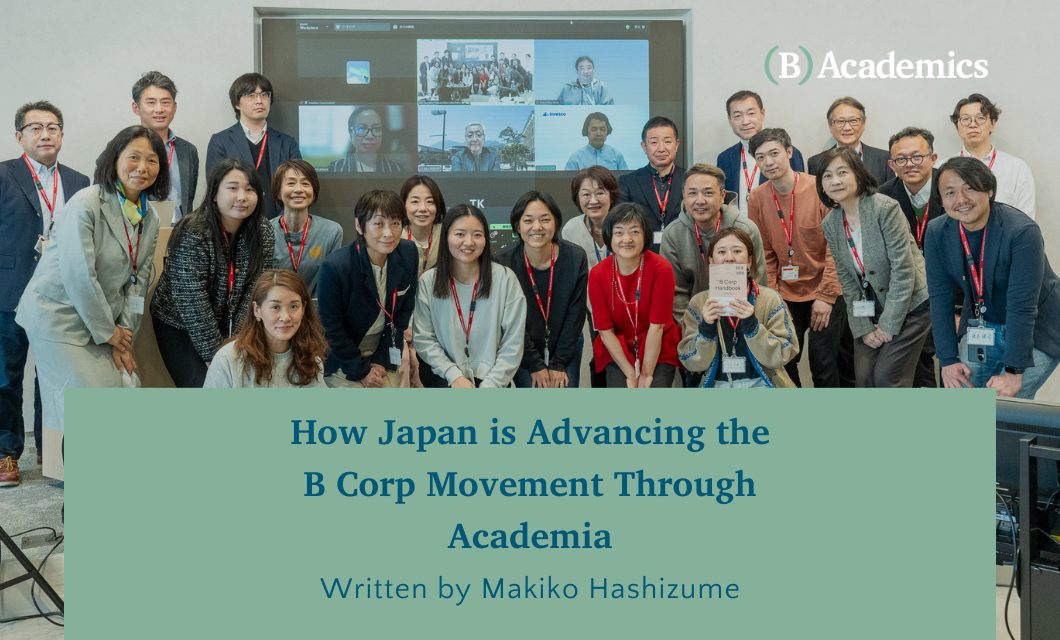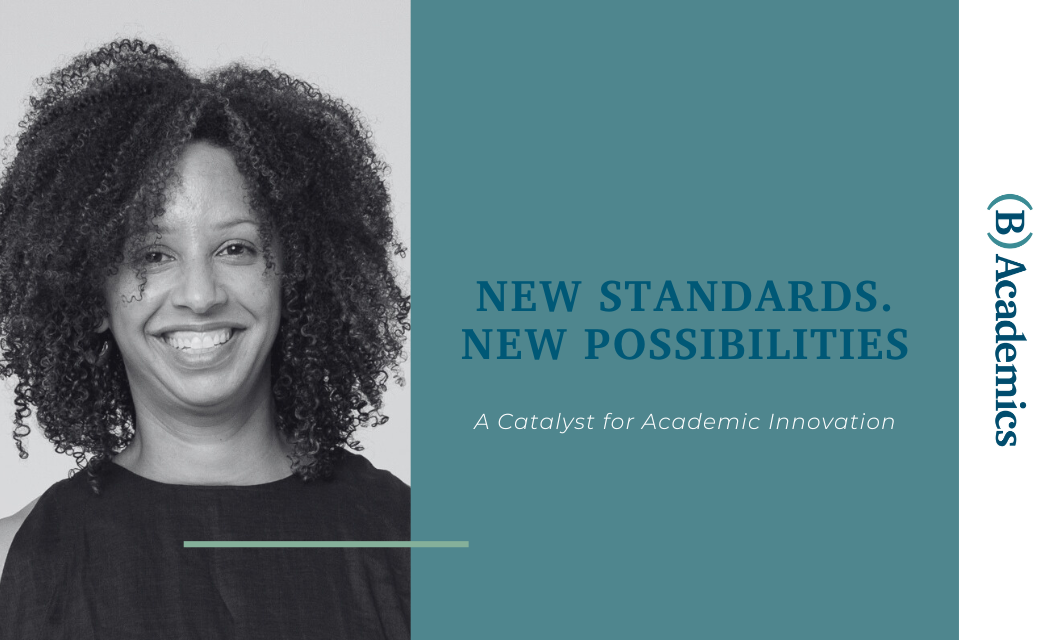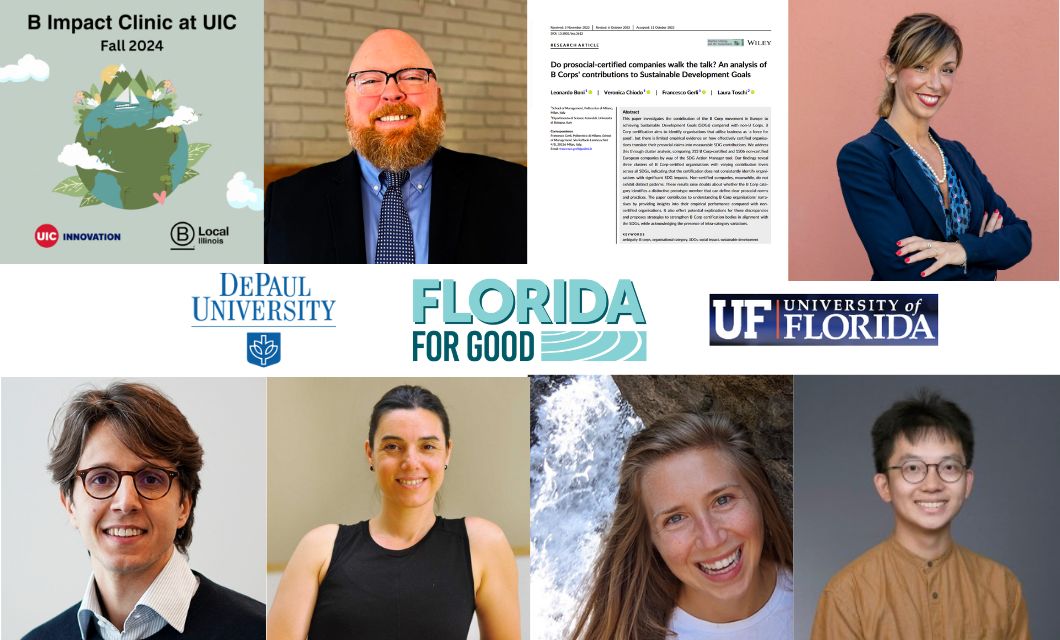In 2023, the B Academics Teaching Roundtable focused on a unique experiential learning model called B Impact Teams (BITs). BITs engage college and university students in working with businesses to measure, manage, and improve their impact using the B Impact Assessment (BIA). The Roundtable offered insights into starting a BIT on campus, contributing to the strengthening of the BIT ecosystem, and engaging with Ryan Honeyman, a prominent B Corp champion and author. Here are some insights and takeaways from the event:
Faculty
Academics Engagement with the B Corp Movement
Faculty from various universities discussed their involvement in the B Corp movement and how it has impacted business school education. Several faculty integrated B Corps into their course work at different levels from case studies, utilizing the B Impact Assessment, and running BIT programs.
Career Preparation and Professional Networks
Faculty highlighted the importance of career preparation through initiatives like mentoring aspiring social entrepreneurs, creating student networks for career development, and engaging students in professional networks.
Challenges and Strategies in Business Sustainability Education
Faculty discussed barriers to implementing impactful courses, improving student engagement, and promoting sustainable business practices, offering strategies such as experiential learning, industry partnerships, and community involvement.
Overall Feedback
- Developing networks of alumni to connect to current students for career development opportunities in business sustainability
- Create communities of practice or mentorship opportunities for faculty at different levels of BIT or B Corp education maturity to foster support and collaboration
- Barriers to implementing BITs or B Corp Courses: low student engagement, lack of data
- Student engagement strategies: Bring local large companies to the classroom or industry specific interests
- More formalized partnerships between student clubs, institutions, B Locals, B Lab, B Corps and nonprofit organizations
- Expanding and partnering with HBCUs and MSIs to bring B Corp education to underserved communities
- Connecting B Corp teachings to AACSB societal impact requirement
Students
Sustainability Consulting and Career Development
Students emphasized the value of early engagement in BIT programs. Students understand the importance of experiential learning, internships, and collaboration with professionals to develop practical skills and enhance career prospects, particularly through programs like B Corp consulting and micro-credentialing.
Community Building and Academic Engagement
Students discussed the significance of community building within the B Corp movement, emphasizing the role of local leaders and programs in supporting and growing the B Corp community. There was also interest in enhancing academic partnerships to expand access to B Corp-related education and training.
Global Collaboration and Impact
Students expressed interest in fostering cross-campus interactions and global collaborations to share best practices and resources, align standards, and enhance the impact of sustainability initiatives. This highlights a growing interest in aligning values and skills with employers’ expectations, demonstrating a shift towards more sustainable and socially responsible business practices.
Overall Feedback
- Cross campus forums to share best practices on sustainability skills
- Student led clubs and BIT initiatives
- Connect students early in their academic careers with B Locals
- Creative cross institution solutions such as partnerships to help HBCUs, MSIs or institutions with limited funding share resources
- Student micro credential for completing a BIT program
The B Community
Enhancing Collaboration with Certified B Corporations
The B Community discussed ways in which academics can collaborate with certified B Corporations, B consultants, and B Lab representatives, emphasizing the importance of improving resource creation for companies.
Community Building and Local Impact
The B Community talked about the importance of building local B Corp communities and supporting local businesses within the B Corp space. Additionally a discussion on bringing BITs to Historically Black Colleges/Universities (HBCUs) and Minority-Serving Institutions (MSIs). Lastly, the potential for a micro-credentials to showcase student success in BIT programs.
Academic Partnerships and Curriculum Development
Insights were shared on academic partnerships and curriculum enhancement, exploring ways for institutions lacking B Corp-related education to collaborate with universities.
Overall Feedback
- Get academics and B Locals involved in the recertification process for companies earlier
- B Lab hosted resources to connect prospective B Corps to B Consultants, BITs, and other resources and options to support certification
- A directory of B Impact Teams by region
- Finding a way to centralize and gather BIT data
- Partnering with local government to advocate for B Corp adoption by state
How B Academics is working to fill these gaps
Expanded BIT Resources and Offerings
B Academics Teaching and Curriculum Innovation committee has worked hard to continue building out a spectrum of BIT offerings to meet you wherever you are at in your BIT journey. From our free “How to Start a B Impact Team at your College or University” article, to our BIT Webinars, Summer BIT program and BIT in a box workshop. Check out our BIT resource page to learn more!
Building Partnerships
We value all our stakeholders. Through continued partnership and collaboration with B Lab, B Locals, and academic institutions around the world, we strive to consider everyone’s role within the BIT ecosystem.
Stakeholder Feedback
Through our Teaching Roundtable and BIT Conversation Series we aim to continue these conversations to collaborate globally and share best practices and resources on B Impact Teams programs. Our goal is to spread knowledge and continually improve on the BIT model in order to serve various communities and institutions to contribute to the B movement.



